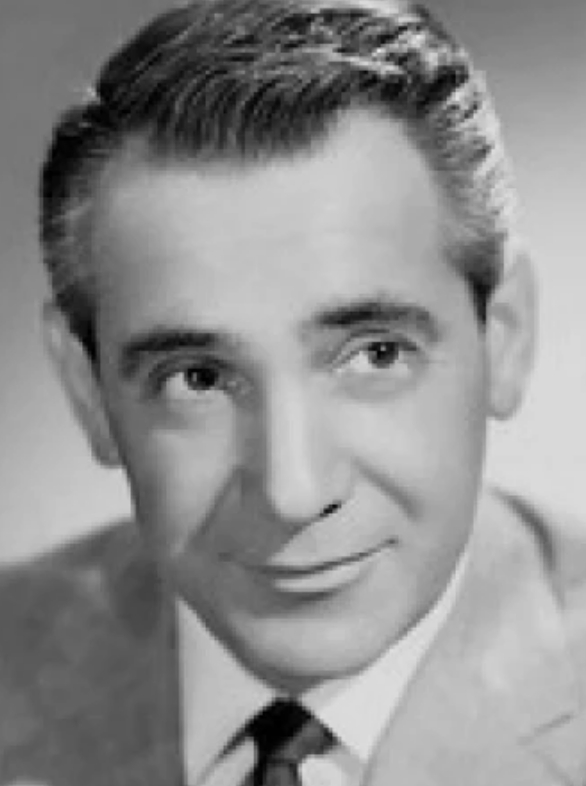On this date in 1912, songwriter Jack Lawrence (né Jacob Louis Schwartz) was born in Brooklyn, N.Y., the third of four sons of Jewish parents Fruma (Goldman) and Beryl Cherniafsky, first cousins who emigrated from Ukraine in 1902. After graduating from Thomas Jefferson High School, he enrolled in the First Institute of Podiatry (now the New York College of Podiatric Medicine), due mostly to parental pressure and earned a doctoral degree in 1932, the same year his first song (“Play, Fiddle, Play”) was published.
Publication of his song “convinced him that his career could rise higher than the human foot.” (New York Times, March 18, 2009) He joined ASCAP, the American Society of Composers, Authors and Publishers, at age 20. Primarily a lyricist, he would on occasion compose and vocalize. Many of his songs became American standards and he was inducted into the Songwriters Hall of Fame in 1975.
At times in the 1930s, he toured the eastern seaboard with Songwriters on Parade, a revue featuring various line-ups of tunesmiths. He served in the Coast Guard and Merchant Marine during World War II. Hollywood beckoned after the war. He wrote songs for a number of movies, including “Hold My Hand,” featured in “Susan Slept Here.” It was nominated for the 1954 Best Song Oscar.
“If I Didn’t Care,” for which he wrote lyrics and music, in 1939 became the Ink Spots’ first recording to hit the U.S. pop charts and went on to sell over 19 million copies. Much later it played over the opening credits in the 1994 film “The Shawshank Redemption.” “All or Nothing at All,” with Arthur Altman, topped the charts in 1943 for Frank Sinatra, accompanied by the Harry James Orchestra.
Lawrence wrote “Linda” for his lawyer Lee Eastman’s daughter, who would marry Paul McCartney in 1969. It was a 1947 hit for Buddy Clark. Other highlights from the Lawrence oeuvre include “Tenderly” (1947), which became a hit for Sarah Vaughan, Nat King Cole, Rosemary Clooney and pianist Art Tatum, “Sunrise Serenade” for Glenn Miller, “Sleepy Lagoon” for Harry James and The Platters and numerous others.
He was the longtime intimate companion of Walter David Myden, a psychologist and social worker, whose death in 1975 of a heart attack hit Lawrence hard. He then met Richard Debnam, who had retired as a Broadway dancer (“Seventeen” and “Damn Yankees”) and an Ice Follies performer.
In 1979 in his mid-60s, he adopted Debnam, 20 years his junior. Before same-sex marriage became legal, it was not uncommon for gay couples to pursue adoption as a legal protection for inheritance and other purposes. They bought two theaters in New York City and co-produced the critically acclaimed Broadway revue “Lena Horne: The Lady and Her Music” in 1981.
Lawrence’s 2004 memoir They All Sang My Songs is dedicated: “For Richard, who helped me through the night.” He scoffed in that memoir at Jewish pride in seeing themselves as God’s Chosen People. “Chosen for what? Five thousand years of persecution, diaspora, holocaust, and anti-Semitism?” He berated Hasidic and Southern Baptist bigots, Muslim suicide bombers and religions which assign women second-class status.
“Religion through the centuries has always been divisive, has always resulted in blood wars, has always pitted sects against each other,” Lawrence wrote. “I believe in being part of my little world, my community, of giving back some of what the world has blessed me with.” Then he mentioned helping rebuild his local Mark Twain Library, expanding the hospital in Danbury, Conn., and acquiring open acreage for a land trust. “I believe all of that is my religion.”
Lawrence fractured his pelvis in a fall at home in West Redding, Conn., and died at age 96 of renal failure and complications from the fall. He was collaborating on a new song with Quincy Jones titled “Nostalgia” at the time. (D. 2009)


